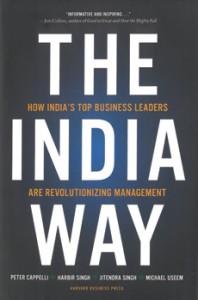The authors interacted with more than 100 executives from top Indian companies, including almost every well-known business leader in India, asking them about the leadership qualities most vital for success. From those interactions, the authors distilled four fundamental management practices that they define as “the India Way”:
1. Holistic engagement with employees: Instead of employees being viewed as a cost, they are considered critical obligations and a key factor that determines business success.
2. Improvisation and adaptability: Indian businesses operate in complex, uncertain, and often volatile business and regulatory environments. Circumventing these complexities requires quick and agile adaptability, improvisation, and execution.
3. Creative value propositions: Some of the most extraordinary business success stories in India are based on unconventional, innovative, and sometimes counterintuitive value propositions.
4. Broad mission and purpose: While defining the mission and purpose of the enterprise, Indian leaders place significant emphasis on broader, nonfinancial parameters like social engagement and concern for the community and the country.
These principles contrast with Western management practices, which often are focused on maximizing investor returns and based on the assumption that “the common good is best served by the uninhibited pursuit of self interest (of investors).” The practices comprising the India Way take a more broad, multi-stakeholder view, positing that the purpose of business enterprise isn’t only to ensure high returns for investors but also to ensure that all stakeholders—employees, consumers, business partners, and society in general—can benefit.
The India Way gives an alternate management philosophy that demonstrates the power of collective calling over private purpose and can help business leaders develop new ways of competing in a changing world. Interspersed with case studies and significant Indian business success stories from the last two decades, this interesting and relevant book is for anyone who wants to broaden his or her idea of business strategy.

May 2015




